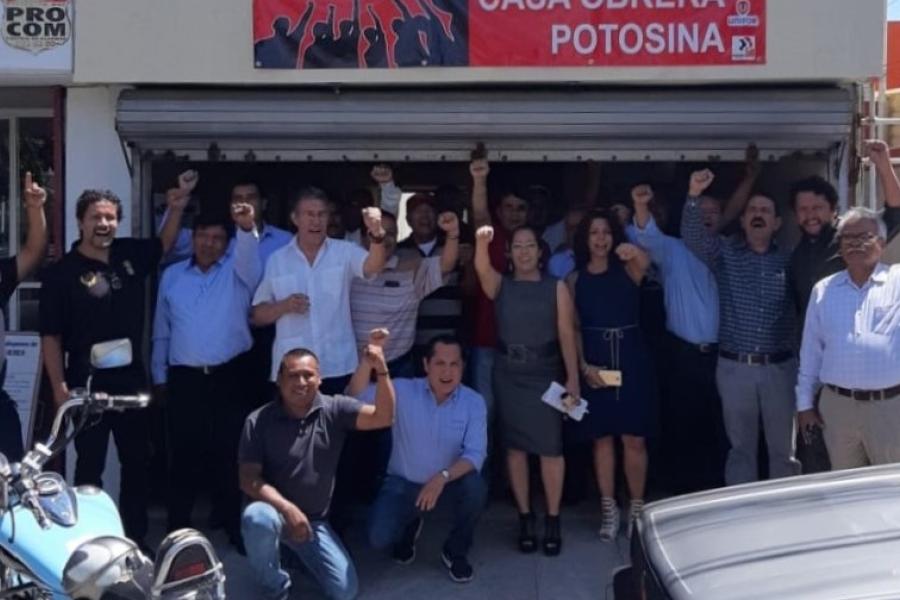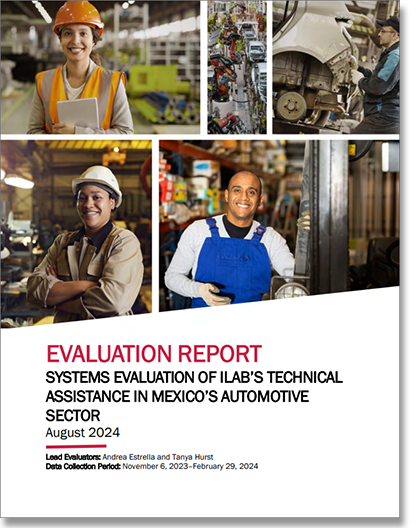The United States-Mexico-Canada Agreement (USMCA) has the strongest and most far-reaching labor provisions of any trade agreement. The agreement contains a labor chapter that prioritizes labor obligations by including them in the core of the agreement and making them fully enforceable. This is a major change from NAFTA, which only contained a side agreement on labor, and it greatly benefits American workers and businesses by holding Mexican manufacturers to the same labor standards as employers in the United States.
Complementing the USMCA's cutting-edge labor provisions, the agreement also contains a groundbreaking enforcement provision. The Rapid Response Labor Mechanism is the first of its kind allowing the United States to take enforcement actions against individual factories if they fail to comply with domestic freedom of association and collective bargaining laws.
The USMCA implementing legislation includes $210 million to ILAB for USMCA-implementation activities: $180 million over four years for USMCA-related technical assistance projects and $30 million over eight years for the capacity of ILAB to monitor USMCA compliance, including the necessary expenses of additional full-time ILAB employees for the Interagency Committee and labor attachés in Mexico.
Success Stories

Transparency and Accountability for Mexico’s Unions
Read how the government of Mexico is making public millions of union documents to promote union democracy.

A Place in Mexico for Workers to Gather and Promote Their Rights
ILAB-funded Solidarity Center project established a worker center in Mexico to help ensure worker voice is truly heard.
Requirements
Among its provisions, the USMCA Labor Chapter:
- Requires the Parties to adopt and maintain in law and practice labor rights as recognized by the International Labor Organization (ILO), to effectively enforce its labor laws, and not to waive or derogate from its labor laws.
- Includes new provisions that require the Parties to take measures to prohibit the importation of goods produced by forced labor, to address violence against workers exercising their labor rights, to address sex-based discrimination in the workplace, and to ensure that migrant workers are protected under labor laws.
- Includes an Annex on Worker Representation in Collective Bargaining in Mexico, under which Mexico commits to specific legislative actions to provide for the effective recognition of the right to collective bargaining.
- To fulfill this commitment, Mexico enacted historic labor reforms on May 1, 2019, and is implementing transformational changes to its labor regime, including new independent institutions for registering unions and collective bargaining agreements and new and impartial labor courts to adjudicate disputes.
- Allows for workers to engage in real collective bargaining and will require companies in Mexico to abide by the same basic labor principles that companies in the United States do.
Petitions under the USMCA Labor Chapter and Rapid Response Labor Mechanism
Advancing Labor Rights through USMCA: The Goodyear Story
Workers at a Goodyear facility in San Luis Potosí, Mexico sought to form an independent union and exercise their right to form and participate in a union and bargain collectively. Watch their story and learn how the United States-Mexico-Canada Agreement is helping to advance labor rights in Mexico and to level the playing field for companies and workers in the U.S.
Petitions and information alleging a failure to comply with the labor obligations under the USMCA Labor Chapter or denial of rights at a covered facility, as those terms are defined in the USMCA Procedural Guidelines related to the Rapid Response Labor Mechanism of the USMCA (Annex 31–A), should be sent to Office of Trade and Labor Affairs, Bureau of International Labor Affairs, U.S. Department of Labor, 200 Constitution Avenue NW, Room S-5315, Washington, DC 20210, USMCA-petitions@dol.gov, telephone number 202-693-4649.
USMCA Web-Based Hotline
To provide confidential information regarding labor issues among USMCA countries, please visit the USMCA hotline.
ILAB's Role
ILAB has a longstanding, productive relationship with Mexico and is the U.S. government's point of contact on international labor. In that capacity, ILAB is responsible for monitoring and engaging with Mexico and Canada regarding their labor commitments, and, where necessary, works with the Office of the U.S. Trade Representative (USTR) in enforcing those commitments.
Monitoring and Enforcement
The Labor Chapter language designated the U.S. Department of Labor as the point of contact for addressing matters related to the agreement. The USMCA implementing legislation establishes an Interagency Labor Committee for Monitoring and Enforcement, co-chaired by the Department and the USTR, to coordinate U.S. efforts with respect to implementation and maintenance of the USMCA labor obligations, to monitor Mexico's historic labor reforms, and to enforce USMCA labor provision where necessary. Among the many responsibilities of the Committee, it will receive and review submissions under the USMCA Labor Chapter and Rapid Response Labor Mechanism.
Technical Assistance
Since 2016, ILAB has invested approximately $220 million in technical assistance activities in Mexico, of which $180 million have been dedicated USMCA funds. The funding continues to support the Government of Mexico to implement labor reform, strengthen labor standards to protect workers, promote acceptable conditions of work, and address risks of child labor and forced labor.
Specifically, projects supported with USMCA funds are strengthening government capacity in Mexico to:
- implement its labor reforms, including training and support for the new labor courts and centers to conciliate disputes and register unions and collective bargaining agreements
- improve government enforcement of labor laws and adhere to commitments related to collective bargaining, secret ballot voting for union representation challenges approval of collective bargaining agreements; and
- combat child labor and forced labor, enforce labor laws and acceptable conditions of work in the agriculture sector, and promote economic empowerment of vulnerable women and girls.
Learn more about our impact in the auto sector.

Access the evaluation and five learning briefs in English and Spanish.
Labor Attachés
Labor attachés in three strategic locations in Mexico allow ILAB to meet the Congressional directive to monitor and enforce USMCA labor obligations. ILAB deployed two labor attachés to Mexico City in FY 2021 and three additional labor attachés in Mexico City, Monterrey, and Tijuana in FY 2022, bringing our total to five. The attachés serve as the principal experts on labor and employment issues in Mexico for officials of the U.S. Department of Labor and other U.S. government agencies. They travel on a regular basis to build contacts among stakeholders, conduct interviews and gather data key to measuring progress on Mexico’s implementation of its May 1, 2019, labor law reform and the development and implementation of the U.S. Department of Labor technical assistance programs in Mexico.
Cases
In addition to petitions under the Labor Chapter, the agreement includes the innovative Facility Specific Rapid Response Labor Mechanism (RRM) that permits the U.S. Government to take expedited enforcement actions against individual factories that appear to be denying workers the right of freedom of association and collective bargaining under Mexican law. Stakeholders can file labor chapter petitions and Rapid Response petitions, and the U.S. government can also self-initiate RRM actions. The Department of Labor and the Office of the U.S. Trade Representative have already collaborated on multiple RRM cases to protect workers’ rights under the USMCA. Read more about individual cases here.
